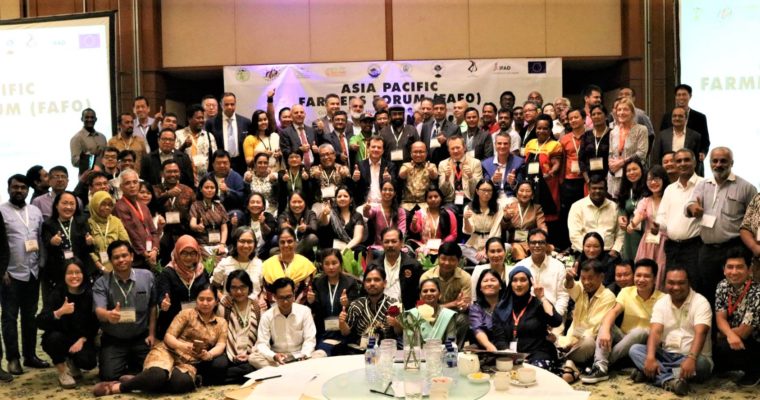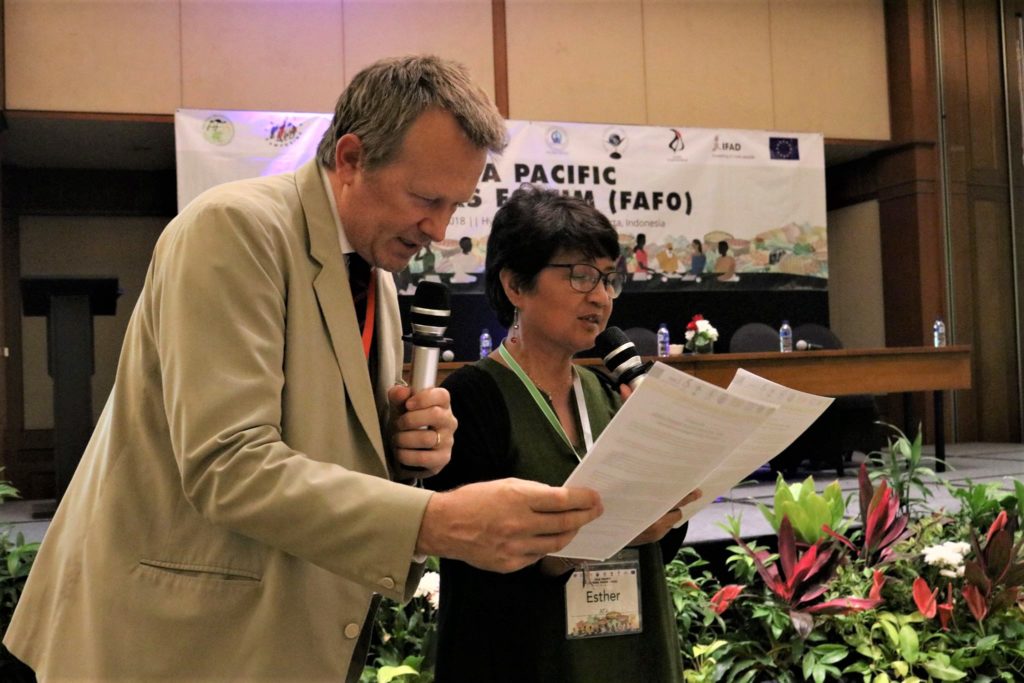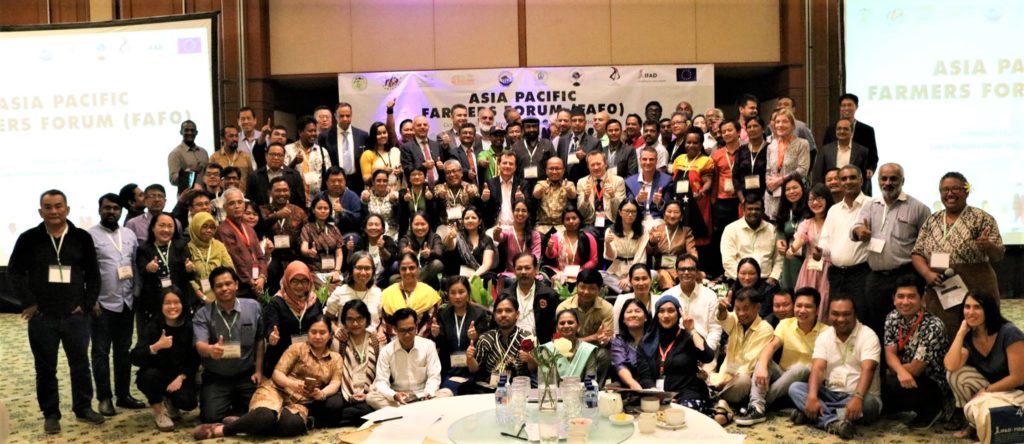YOGYAKARTA, INDONESIA – On October 20, 2018, 84 farmer leaders from 21 countries, representing 38 million small scale farmers, fishers, indigenous peoples, herders and pastoralists, met with the 37 staff of the IFAD Asia and Pacific Region Division in Yogyakarta, Indonesia, for the first Asia Pacific Region Farmers Forum (FAFO). The Forum was held in conjunction with the IFAD APR workshop that took place October 18-23, 2018.
The Asia Pacific Farmers Forum’s objective was mainly to identify and strengthen areas of collaboration and partnership between IFAD and Farmers’ Organisations at the country and regional levels, based on mutual interests, capacities and mandates.
The Asia Pacific FAFO draws from the strength and lessons learned from the global FAFO that IFAD has been organizing every two years since 2006, in Rome, Italy. The FAFO is a bottom up process of consultation, dialogue and partnership between FOs, IFAD and governments for rural development and poverty reduction. After 5 global FAFO meetings, both FOs and IFAD felt that to be truly beneficial to smallholder family farmers, fishers, indigenous peoples and pastoralists, there was a need to develop concrete collaboration and partnership at the country level, where IFAD investments are made.
Asia and the Pacific is home to 60% of the world’s population, with half of them living in rural areas and mostly relying on agriculture, forestry, fisheries, and pastoralism for a living. It is also home to 80% of small-scale family farmers who produce 60% of the world’s food. However, 60% of the world’s poorest and hungriest are in the Asia Pacific region. Family farmers in this region continue to be exploited by anti-development corporate interests such as large mining and land-grabbing, and continue to suffer from degraded ecosystems aggravated by climate change, unjust trade agreements, poor implementation of policies, and insignificant participation in decision making processes.
FOs appreciate the role of IFAD in supporting the government’s policies and programs in reducing poverty and hunger in the region, and in facilitating the engagement of FOs in such government’s programs. IFAD appreciates the role of FOs in being credible partners in sustainable agriculture/rural development, especially in the areas of policy advocacy, service delivery and legitimate representation of millions of small-scale family farmers in the region. During the Asia Pacific FAFO, presentations on cases of IFAD and FO partnerships, both at regional and country levels, illustrated that effective partnerships between FOs and IFAD have delivered results on the ground in the past. Therefore, good practices require replication, while innovation in engagement would be also instrumental for achieving goals of eradication of poverty, hunger and strengthening rural development.
IFAD APR DIVISION IS COMMITTED TO operationalize and strengthen the partnerships at country and regional level, and agrees that:
- Where possible, FO representatives should be a part of the design process for new IFAD projects in the region.
- Where possible and mutually beneficial, farmer organisations will be considered as key partners in the implementation of IFAD funded projects in the country.
- APR will involve FO’s in the IFAD COSOP and country portfolio design and review processes, with sufficient time given to FOs to consult their members to contribute in a more consistent manner.
- Where possible, the involvement of the FOs or their members in IFAD’s national projects’ supervisions, mid-term reviews and termination workshops is desirable.
- IFAD recognizes the added value of FOs in promoting and upscaling best practices within their farmer’s networks and IFAD projects, and will invite FOs to participate in KM events organised by IFAD.
- A relationship between the organisations provides many opportunities to bring the voice of farmers in the country to policy makers and planners and that both parties will continue to explore opportunities to capitalize on this relationship such as a national Farmers’ Forum.
FARMERS ORGANIZATION MOVEMENTS ARE COMMITTED TO:
- Proactively strengthen interaction with IFAD at country and regional levels by initiating and following through dialogues and communication lines and actively participating in IFAD organized events and processes.
- Build and strengthen their capacities (a) to be more accountable to members and partners, (b) to be more effective in delivering economic services to their members and project commitments to donor partners and (c) in engaging in policy work with our governments.
- Strengthen solidarity and knowledge exchange among FOs in our country and our region that we may be able to be a stronger and united voice of the small-scale family farmers in this region.
As concrete steps towards committing to work together in more concrete terms, action plans have been developed for each country, resulting from the country roundtable discussions held during the Forum. Both FO and IFAD delegates commit to follow through to its fruition these plans in the next two years, leading to the next global FAFO in 2020.
DOWNLOAD: Asia Pacific Region Farmers Forum Joint Statement
Visit to Tani Organic Merapi (TOM)
About the Farmers’ Forum (FAFO)
The Farmers’ Forum (FAFO) is a bottom-up process of consultation and dialogue between small farmers and rural producers’ organizations, IFAD and governments for rural development and poverty reduction. Shaped by a consensus document (see box 1) that guides the collaboration, the FAFO was established in 2006, as an operational tool to provide orientation to IFAD operations and to jointly identify opportunities for the development of partnerships between IFAD and FOs. The first FAFO global meeting took place on February 2006, in conjunction with the IFAD Governing Council. Since then five additional global meetings were held in 2008, 2010, 2012, 2014 and 2016.
In 2014, a study of the partnerships between IFAD and Farmers’ Organisations (FOs) noted that the momentum of these partnerships had reached a plateau, whereas country-level engagement with FOs was diminishing. One of the reasons identified was that the global FAFO process was too focused at the global level while collaboration and dialogue at regional and country level, i.e. where IFAD operates, was not systematic and thus, opportunities were lost.
In this context, during the 6th Global meeting of the Farmers’ Forum held in 2016, the FAFO Steering Committee (SC) members agreed to decentralize the FAFO process and to begin holding regional level FAFOs in order to ‘be closer’ to the farmers and to foster greater involvement of IFAD regional divisions and country programs. As such, the process will now be organized on a four-year basis with global meetings organized every four years (hence with the next one occurring in 2020) and regional consultations where IFAD operates organized in between. In addition, it was also decided to use the IFAD geographical structure for the organization of the regional FAFOs, and whenever possible to organize the regional FAFOs in concomitance with the IFAD regional divisions’ implementation workshops, in order to facilitate interactions between FOs, IFAD and the IFAD funded projects and programs.
Objectives
- understand and appreciate the FaFO process at global, regional and country levels
- understand, appreciate and learn from the work of IFAD and the dynamics of FO-IFAD engagement in Asia Pacific region , and the at regional and country levels
- identify areas of potential and stronger interaction and collaboration
• between FOs, IFAD and IFAD funded projects and programs at national and regional levels.
• between FOs in the region in order to strengthen the engagement between FOs and IFAD






Comments are closed